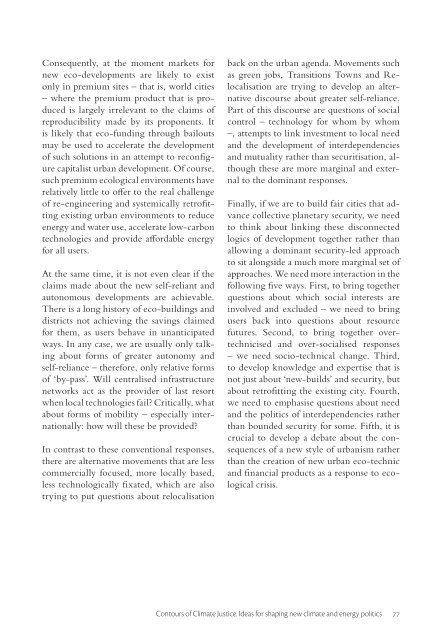Contours of Climate Justice - Dag Hammarskjöld Foundation
Contours of Climate Justice - Dag Hammarskjöld Foundation
Contours of Climate Justice - Dag Hammarskjöld Foundation
Create successful ePaper yourself
Turn your PDF publications into a flip-book with our unique Google optimized e-Paper software.
Consequently, at the moment markets for<br />
new eco-developments are likely to exist<br />
only in premium sites – that is, world cities<br />
– where the premium product that is produced<br />
is largely irrelevant to the claims <strong>of</strong><br />
reproducibility made by its proponents. It<br />
is likely that eco-funding through bailouts<br />
may be used to accelerate the development<br />
<strong>of</strong> such solutions in an attempt to reconfi gure<br />
capitalist urban development. Of course,<br />
such premium ecological environments have<br />
relatively little to <strong>of</strong>f er to the real challenge<br />
<strong>of</strong> re-engineering and systemically retr<strong>of</strong>i tting<br />
existing urban environments to reduce<br />
energy and water use, accelerate low-carbon<br />
technologies and provide aff ordable energy<br />
for all users.<br />
At the same time, it is not even clear if the<br />
claims made about the new self-reliant and<br />
autonomous developments are achievable.<br />
There is a long history <strong>of</strong> eco-buildings and<br />
districts not achieving the savings claimed<br />
for them, as users behave in unanticipated<br />
ways. In any case, we are usually only talking<br />
about forms <strong>of</strong> greater autonomy and<br />
self-reliance – therefore, only relative forms<br />
<strong>of</strong> ‘by-pass’. Will centralised infrastructure<br />
networks act as the provider <strong>of</strong> last resort<br />
when local technologies fail? Critically, what<br />
about forms <strong>of</strong> mobility – especially internationally:<br />
how will these be provided?<br />
In contrast to these conventional responses,<br />
there are alternative movements that are less<br />
commercially focused, more locally based,<br />
less technologically fi xated, which are also<br />
trying to put questions about relocalisation<br />
back on the urban agenda. Movements such<br />
as green jobs, Transitions Towns and Relocalisation<br />
are trying to develop an alternative<br />
discourse about greater self-reliance.<br />
Part <strong>of</strong> this discourse are questions <strong>of</strong> social<br />
control – technology for whom by whom<br />
–, attempts to link investment to local need<br />
and the development <strong>of</strong> interdependencies<br />
and mutuality rather than securitisation, although<br />
these are more marginal and external<br />
to the dominant responses.<br />
Finally, if we are to build fair cities that advance<br />
collective planetary security, we need<br />
to think about linking these disconnected<br />
logics <strong>of</strong> development together rather than<br />
allowing a dominant security-led approach<br />
to sit alongside a much more marginal set <strong>of</strong><br />
approaches. We need more interaction in the<br />
following fi ve ways. First, to bring together<br />
questions about which social interests are<br />
involved and excluded – we need to bring<br />
users back into questions about resource<br />
futures. Second, to bring together overtechnicised<br />
and over-socialised responses<br />
– we need socio-technical change. Third,<br />
to develop knowledge and expertise that is<br />
not just about ‘new-builds’ and security, but<br />
about retr<strong>of</strong>i tting the existing city. Fourth,<br />
we need to emphasise questions about need<br />
and the politics <strong>of</strong> interdependencies rather<br />
than bounded security for some. Fifth, it is<br />
crucial to develop a debate about the consequences<br />
<strong>of</strong> a new style <strong>of</strong> urbanism rather<br />
than the creation <strong>of</strong> new urban eco-technic<br />
and fi nancial products as a response to ecological<br />
crisis.<br />
<strong>Contours</strong> <strong>of</strong> <strong>Climate</strong> <strong>Justice</strong>. Ideas for shaping new climate and energy politics 77
















